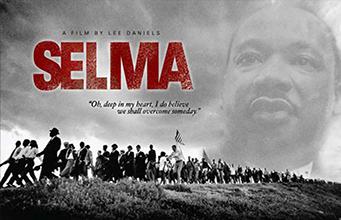

Last week, 27 African-American leaders in the New York business community created a fund that allowed middle school students to see the movie “SELMA” for free. This was an incredible opportunity for youth across New York City, and as we celebrate the Dr. Martin Luther King holiday, a timely one.
The movie, SELMA, shares the story of Dr. Martin Luther King’s campaign to secure equal voting rights through an epic march from Selma to Montgomery, Alabama in 1965. The movie shares a close look at how people of color committed themselves to a cause and rallied together to accomplish a goal. The film shared truths from a tough time in African American history and shed much needed light on where we’ve come from, and where we must go.
I’m a young black man born and raised in New York City, and while I don’t have firsthand experience of life in Alabama, or know exactly what it feels like to fight against political powers for my right to vote, I am deeply connected to what this struggle means to our culture, and certainly, my personal lineage. My own grandparents and mother, all born in Birmingham, were a part of the fight and saw this unfold in their own backyards. So for me, this piece of history is deeply rooted in the fabric of my life and family.
Not only that, but I see so much of myself in the story of Selma and Dr. King. He was committed to a cause and recognized that his voice mattered. In a time and society where he was oppressed for the color of his skin, he did what he could; using what he had, and rallied people around the world to fight with one collective voice. He knew that his life and voice mattered and wasn’t afraid to be an agent of change for himself and for generations in the future.
As I think about what his life meant, and his fight, it makes me reflect closely on my own and what I see around me. Every day, I work with youth of all ages at Goddard Riverside’s Beacon program. Students fill our hallways after school in need of mentorship. They need someone to listen to them and help them navigate the challenges of school, home life, and societal pressures. My students come to me with questions about what they see in the news; confused about how and why teens are murdered at the hands of police. They witness the unrest in their neighborhoods and the protests because of tensions in the city. While our battles look different in 2015, there is definitely fighting to be done.
For me, creating a safe place of positive influence is the way I fight for our students and community. When I created a basketball program for youth on the Upper West Side, it wasn’t just for the sake of playing the game. I was inspired to do what I could, using what I have. My experience as a ball player and the camaraderie, discipline and sportsmanship I found in the game helped me become a more focused student. I want to give that back to the kids of my community as well as our Beacon students. Like Dr. King, I aim to encourage generations coming after me to pursue their brightest futures and make positive contributions to their communities. Through my work at Beacon, and with the help of basketball, I hope to leave a positive imprint on their lives.
– Nick Steele,
Director of Sports, Goddard Riverside Beacon Program